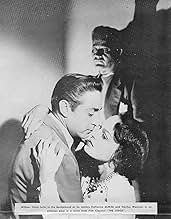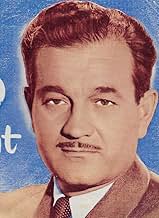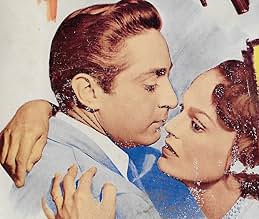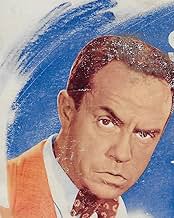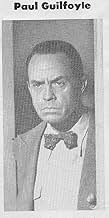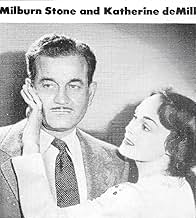Füge eine Handlung in deiner Sprache hinzuA crooked lawyer blackmails a client into a murder plot against his wife.A crooked lawyer blackmails a client into a murder plot against his wife.A crooked lawyer blackmails a client into a murder plot against his wife.
Joseph Forte
- District Attorney
- (as Joe Forte)
Jess Kirkpatrick
- Patrolman Patrick Riley
- (as Jesse Kirkpatrick)
Al Rosman
- Crippled Victim
- (Nicht genannt)
Empfohlene Bewertungen
And also his last.... Yes, this scheme reminded me SO DARK THE NIGHT, where Steven Geray was a detective investigating on his own crime, the crime he commited himself. The story is not the same but the overall feeling for the audiences, who discover something unusual, different, is nearly the same. That's precisely what's interesting here, no cliché, nothing predictable. With Fritz Lang's BEYOND A REASONABLE DOUBT, the overall feeling for the audience is also close to this one; some court story so thrilling, exciting, because never seen before. Awesome ending too, to close a flat, bland director's career. Except his silent features. He died in anonymity.
One of the last films directed by the great Elmer Clifton, whose career dates back to the mid-teens and D.W.Griffith, The Judge was also the first production of Ida Lupino's production company, first called Emerald Productions, later called The Filmmakers.
This is a quirky film which is both hard-boiled and pretentious, raw and artsy. It is also a film that raises as many questions as it answers. Elements are introduced into the story, covered in detail, and then not developed. Dream sequences are introduced, but are unclear. The main character--who is a sleazy defense attorney, NOT a judge--is well-played by Milburn Stone, but his story is not really typical of anyone other than this one oddball character. Why the film is called THE JUDGE, I don't know. The show begins and ends with a judge pulling out a file from his file cabinet, and talking about what a unique and disturbing case this was. The same judge does rule on an important case in the film, but he is not central--one wonders why the film is not called THE DEFENSE ATTORNEY? While star Milburn Stone and some of the supporting actors give good performances, the doctor and Stone's wife are both amateurishly played. Also, no scored instrumental music is feature in the film: only avant-garde acapella choral music, and the wire recording of the violin practicing that is used to get the psycho killer to grab a gun, which is used later as supporting music. This gives the film an art-film feel. A few scenes were unclear and required me to rewind the tape and watch them two or three times. The scene where the guy selling the dolls picks someone's pocket--the guy who later kills a policeman and is blackmailed by Stone--was unclear. Where was that gun coming from? Is this sloppy continuity, or an attempt at being ambiguous? Who knows... When the film ends, somewhat abruptly I might add, the viewer will probably have a number of questions as we did. However, whatever minor flaws I may complain about, The Judge is a unique film experience. Not entirely successful, but unique nonetheless.
This is a quirky film which is both hard-boiled and pretentious, raw and artsy. It is also a film that raises as many questions as it answers. Elements are introduced into the story, covered in detail, and then not developed. Dream sequences are introduced, but are unclear. The main character--who is a sleazy defense attorney, NOT a judge--is well-played by Milburn Stone, but his story is not really typical of anyone other than this one oddball character. Why the film is called THE JUDGE, I don't know. The show begins and ends with a judge pulling out a file from his file cabinet, and talking about what a unique and disturbing case this was. The same judge does rule on an important case in the film, but he is not central--one wonders why the film is not called THE DEFENSE ATTORNEY? While star Milburn Stone and some of the supporting actors give good performances, the doctor and Stone's wife are both amateurishly played. Also, no scored instrumental music is feature in the film: only avant-garde acapella choral music, and the wire recording of the violin practicing that is used to get the psycho killer to grab a gun, which is used later as supporting music. This gives the film an art-film feel. A few scenes were unclear and required me to rewind the tape and watch them two or three times. The scene where the guy selling the dolls picks someone's pocket--the guy who later kills a policeman and is blackmailed by Stone--was unclear. Where was that gun coming from? Is this sloppy continuity, or an attempt at being ambiguous? Who knows... When the film ends, somewhat abruptly I might add, the viewer will probably have a number of questions as we did. However, whatever minor flaws I may complain about, The Judge is a unique film experience. Not entirely successful, but unique nonetheless.
This is a freakish movie, and it plays a bit like the old radio series "The Whistler."
(Remember that one? "I am the Whistler -- and I know many things, for I walk by night. I know many strange tales hidden in the hearts of men and women who have stepped into the shadows. Yes, I know the nameless terrors of which they dare not speak.")
In this case, instead of The Whistler, we have "The Judge," who opens up his file cabinet of past cases, narrates some opening psychobabble about human minds, and lets us witness first hand the sordid horrors of human psychiatric neurosis, complete with a woozy flashback scene, more casual gun-handling than i have seen outside of a Western, and an acapella choir that sounds like it swallowed a theramin.
And what about Milburn Stone? Wow! Doc Adams on TV's "Gunsmoke" surely deserves kudos for playing firmly against type here. as a man so unexpectedly motivated that to say anything more about his intentions would be to ruin the experience of watching the looks on his face shift with almost every line he delivers.
If this had been a pilot for a very weird short-run TV series, it would have become a cult classic. As it is, it is just straight-out bizarre.
By the way, i'll bet you dollars to donuts that the dog in the opening scenes was trained by Frank Inn, uncredited. It's a larger "Benji" type terrier-shaggy cross, and the stunt is set up exactly like all of Inn's best work with Higgins and his other dogs: The dog has a whole routine or scene memorized, and pulls it off in a nice, long take without ever once looking at the trainer for instructions. Good job, Anonymous Dog! Good job, Frank Inn!
(Remember that one? "I am the Whistler -- and I know many things, for I walk by night. I know many strange tales hidden in the hearts of men and women who have stepped into the shadows. Yes, I know the nameless terrors of which they dare not speak.")
In this case, instead of The Whistler, we have "The Judge," who opens up his file cabinet of past cases, narrates some opening psychobabble about human minds, and lets us witness first hand the sordid horrors of human psychiatric neurosis, complete with a woozy flashback scene, more casual gun-handling than i have seen outside of a Western, and an acapella choir that sounds like it swallowed a theramin.
And what about Milburn Stone? Wow! Doc Adams on TV's "Gunsmoke" surely deserves kudos for playing firmly against type here. as a man so unexpectedly motivated that to say anything more about his intentions would be to ruin the experience of watching the looks on his face shift with almost every line he delivers.
If this had been a pilot for a very weird short-run TV series, it would have become a cult classic. As it is, it is just straight-out bizarre.
By the way, i'll bet you dollars to donuts that the dog in the opening scenes was trained by Frank Inn, uncredited. It's a larger "Benji" type terrier-shaggy cross, and the stunt is set up exactly like all of Inn's best work with Higgins and his other dogs: The dog has a whole routine or scene memorized, and pulls it off in a nice, long take without ever once looking at the trainer for instructions. Good job, Anonymous Dog! Good job, Frank Inn!
At first I thought this was a sleeper in the making. Those early scenes of lunatic Tilton (Budd) are grabbers, especially when he challenges Code by shooting a crippled boy and his dog! Moreover, his contrast with ice cold lawyer Strang (Stone) sets up real character color. So it's no surprise when we find out about Strang's utter lack of legal ethics. But inside the cold exterior, the lawyer's suffering pangs of conscience over the rogues he's gotten off. At the same time, his arrogant wife is two-timing him with his associate, the county doctor, of all people. Thus, despite his rigid demeanor, Strang's not altogether unsympathetic nor unconflicted. Also, director Clifton heightens this first half with some imaginative camera angles and close-ups suggesting a world where anything might happen.
Trouble is the second half bogs down in a lot of talk minus the earlier visual novelties. Though loaded with potential tension, the Russian roulette scene goes on too long and is drained by too much exposition, resulting in an action climax largely wasted. Then too, Strang's motivations behind his murder scheme are muddied up with all the talk that's not helped by an abrupt dream sequence. In short, the promising early part is undone by a awkward latter part. All in all, the movie raises interesting ideas but fails to effectively develop them.
(In passing—For fans of TV's Gunsmoke (1955-1975), it's enlightening to catch actor Stone playing a role opposite to his avuncular Doc Adams in TV's longest running western. However, if he smiled even once as lawyer Strang, I missed it. Anyway, a salute to that fine actor.)
Trouble is the second half bogs down in a lot of talk minus the earlier visual novelties. Though loaded with potential tension, the Russian roulette scene goes on too long and is drained by too much exposition, resulting in an action climax largely wasted. Then too, Strang's motivations behind his murder scheme are muddied up with all the talk that's not helped by an abrupt dream sequence. In short, the promising early part is undone by a awkward latter part. All in all, the movie raises interesting ideas but fails to effectively develop them.
(In passing—For fans of TV's Gunsmoke (1955-1975), it's enlightening to catch actor Stone playing a role opposite to his avuncular Doc Adams in TV's longest running western. However, if he smiled even once as lawyer Strang, I missed it. Anyway, a salute to that fine actor.)
I can't say too much about this film, "The Judge" from 1949. I saw a horrendous print, and I admit I found the story strange.
The movie stars Milburn Stone of Gunsmoke fame. I only know him from Gunsmoke, and I doubt I saw one episode all the way through. He plays attorney Martin Strang, known for taking high-profile cases and winning.
When he learns his wife is cheating on him, he comes up with a way to exact revenge. He approaches a cop killer, William Jackson (Paul Guilfoyle) and takes his case pro bono. However, he exacts a promise from Jackson, if he gets him off, he will ask for a favor in return.
Strang uses a loophole in the law so that Jackson's case is dismissed - temporarily. Jackson will not be indicted for killing a member of law enforcement, but he will be going down for murder. Before Jackson actually realizes this, Strang calls in the favor.
The rest was ridiculous and in fact, as is usual with a lousy script, the narrator had to explain the whole thing at the end. The only interesting thing to me was that the actor Stanley Waxman, who played Mrs. Strang's love interest, looked like Tyrone Power from a distance. The shape of the face, the hairline, the eyebrows. Up close he didn't look like him at all.
I am working off of a list of noirs. I have seen all of the famous ones. The rest of them have been a little disappointing. This was one.
The movie stars Milburn Stone of Gunsmoke fame. I only know him from Gunsmoke, and I doubt I saw one episode all the way through. He plays attorney Martin Strang, known for taking high-profile cases and winning.
When he learns his wife is cheating on him, he comes up with a way to exact revenge. He approaches a cop killer, William Jackson (Paul Guilfoyle) and takes his case pro bono. However, he exacts a promise from Jackson, if he gets him off, he will ask for a favor in return.
Strang uses a loophole in the law so that Jackson's case is dismissed - temporarily. Jackson will not be indicted for killing a member of law enforcement, but he will be going down for murder. Before Jackson actually realizes this, Strang calls in the favor.
The rest was ridiculous and in fact, as is usual with a lousy script, the narrator had to explain the whole thing at the end. The only interesting thing to me was that the actor Stanley Waxman, who played Mrs. Strang's love interest, looked like Tyrone Power from a distance. The shape of the face, the hairline, the eyebrows. Up close he didn't look like him at all.
I am working off of a list of noirs. I have seen all of the famous ones. The rest of them have been a little disappointing. This was one.
Wusstest du schon
- WissenswertesDespite what the narrator say, it is the jury that decides the fate of the defendant and in this case "freed" the defendant. The attorney did not free him, the attorney merely defended him.
Top-Auswahl
Melde dich zum Bewerten an und greife auf die Watchlist für personalisierte Empfehlungen zu.
Details
- Erscheinungsdatum
- Herkunftsland
- Offizieller Standort
- Sprache
- Auch bekannt als
- The Gamblers
- Drehorte
- Produktionsfirma
- Weitere beteiligte Unternehmen bei IMDbPro anzeigen
- Laufzeit1 Stunde 9 Minuten
- Farbe
- Seitenverhältnis
- 1.37 : 1
Zu dieser Seite beitragen
Bearbeitung vorschlagen oder fehlenden Inhalt hinzufügen



